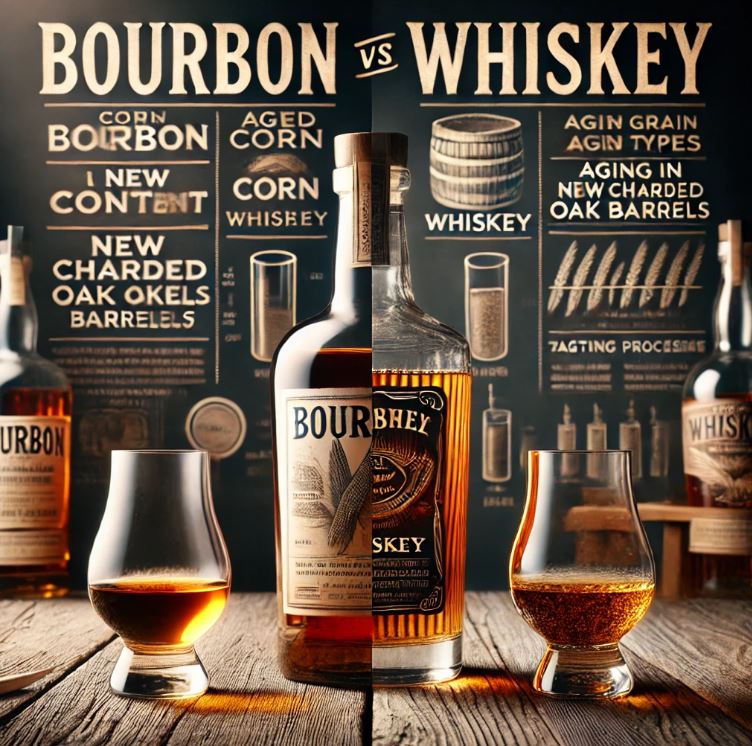For many, the terms bourbon and whiskey are often used interchangeably. However, connoisseurs and aficionados know that there are distinct differences between these two beloved spirits. Understanding these differences not only enhances your appreciation of each drink but also enriches your knowledge of their unique histories and production processes. In this article, we’ll explore the key difference between a bourbon and a whiskey, helping you become more informed and discerning in your choices.
Key Takeaways
- Bourbon is a type of whiskey, but not all whiskey is bourbon.
- The primary differences lie in the ingredients, production process, and legal regulations.
- Bourbon must be made in the USA, primarily from corn, and aged in new charred oak barrels.
Defining Whiskey
Whiskey, or whisky depending on the region, is a broad category of distilled alcoholic beverages made from fermented grain mash. This grain mash can include barley, corn, rye, and wheat. The spirit is typically aged in wooden casks, which impart flavors and colors to the liquid. There are several types of whiskey, including Scotch, Irish whiskey, rye whiskey, and, of course, bourbon. The variations arise from the different grains used, distillation processes, and aging techniques.
What Makes Bourbon Unique?
Bourbon is a specific type of whiskey that adheres to stringent guidelines. To be legally classified as bourbon in the United States, the spirit must meet the following criteria:
- Made in the USA: Bourbon must be produced within the United States.
- Minimum 51% Corn: The grain mash must contain at least 51% corn.
- Aging Process: It must be aged in new, charred oak barrels.
- No Additives: Bourbon cannot contain any additives or coloring.
- Distillation and Bottling: It must be distilled to no more than 160 proof and entered into the barrel at no more than 125 proof. It is bottled at a minimum of 80 proof.
These regulations ensure that bourbon maintains its distinct flavor profile, characterized by rich vanilla, oak, and caramel notes.
Differences in Production
While bourbon and whiskey share many production steps, there are key differences:
- Ingredients: Bourbon’s mash must be at least 51% corn, while other whiskeys can use varying proportions of different grains.
- Barrel Aging: Bourbon must be aged in new, charred oak barrels, which significantly influence its flavor. Other whiskeys may be aged in used barrels or non-charred barrels.
- Geographical Indication: Bourbon must be made in the USA, whereas whiskey can be produced anywhere in the world, leading to diverse regional variations.
Flavor Profiles and Tasting Notes
The specific ingredients and aging processes give bourbon and whiskey distinct flavor profiles:
- Bourbon: Known for its sweeter, fuller body with notes of caramel, vanilla, and oak.
- Scotch Whisky: Often more robust and smoky, with flavors influenced by the barley and the Scottish climate.
- Irish Whiskey: Generally lighter and smoother, with a slightly sweet and nutty flavor.
- Rye Whiskey: Spicier and more intense, with strong pepper and fruit notes.
Understanding these flavor profiles can help you choose the right spirit for different occasions and pairings.
Recent Developments
As of June 20, 2024, there have been several noteworthy developments in the bourbon and whiskey industry. The increasing popularity of craft distilleries has introduced a range of innovative products. Notable mentions include the rise of experimental aging techniques and the introduction of unique grain blends. The demand for premium, aged bourbons has surged, reflecting a growing appreciation for high-quality spirits.
Top Experts and Entities in the Field
Several experts and entities are at the forefront of the bourbon and whiskey industry. Fred Minnick, a renowned whiskey critic and author, continues to influence the field with his insightful reviews and publications. The American Distilling Institute (ADI) plays a significant role in supporting craft distillers and promoting industry standards. Additionally, the Kentucky Distillers’ Association (KDA) is pivotal in advocating for bourbon producers and organizing events like the annual Kentucky Bourbon Festival.
Key Takeaways – Difference Between a Bourbon and a Whiskey
- Bourbon is a specific type of whiskey with strict production criteria.
- Key differences between bourbon and whiskey include ingredients, aging process, and geographical requirements.
- Bourbon is characterized by its sweet, full-bodied flavor profile.
Conclusion
Understanding the differences between bourbon and whiskey enhances your appreciation of these spirits and informs your choices as a consumer. Whether you’re enjoying a smooth bourbon or a robust Scotch, knowing the unique characteristics and production methods of each can deepen your enjoyment.
Author: HowDiff
HowDiff is an expert in identifying and explaining the differences between various subjects, helping people understand subtle distinctions and unique characteristics with clarity and insight.
